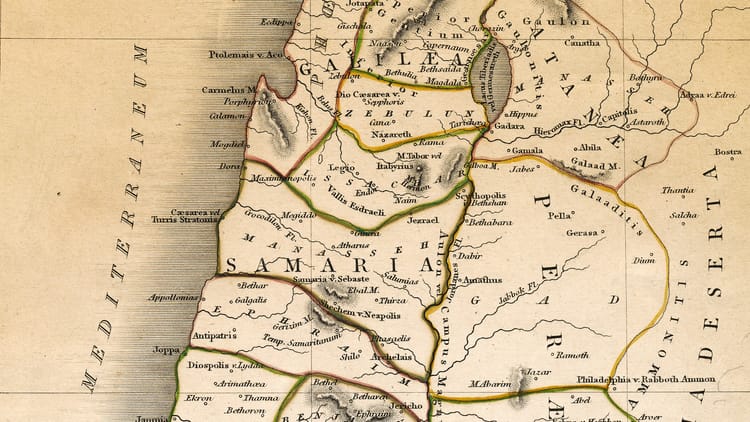When People Don't Want to Hear About Jesus (Acts 4)

Big Idea: Pray for courage to share about Jesus and to see opposition as an opportunity to talk about him.
We have a serious tension, and here it is in a nutshell.
On one hand, we want people to know about Jesus. If you follow Jesus, you probably want others to know about the good news of Jesus: God's Son lived, died, and rose again to make us right with God. This is such good news that we simply want everyone to know about it.
But here’s the other side of the tension: we’re terrified to tell people about Jesus. There’s one simple reason: we aren’t sure how people will respond. People may not like that you talk about Jesus. You could encounter feelings of anger and ridicule. As evangelist Rico Tice says:
Many people really don’t like the gospel. Sometimes they express that politely; sometimes not politely at all; but they don’t like it…
I think that's the main reason why we don't do evangelism. Most Christians, when they first come to faith, want to tell others. Why wouldn't you?! It's brilliant—in Jesus you're in relationship with the living God; you have an answer to death; you have an answer to your sin; you have a point and a purpose to your life. But sooner or later — and in the west, it's happening increasingly soon-someone mocks you or wounds you or dislikes you. And because you're not stupid, you figure it out: I don't want to get hit, and this keeps getting me hit, so something's gone wrong here. I'll stop doing this.
If that’s you — and I think it is a lot of us — today’s passage is going to help.
But first, let me set the scene.
We’re looking at Acts today. Acts tells the story of the spread of the gospel from a few people at the ascension of Jesus to the edges of the Roman Empire. Acts introduces us to how the church started and the gospel spread. It’s an incredible book.
So far we’re in the early chapters. Dwain’s shown us the glory of the ascension and the birth of the church. Today, we encounter the first sign of trouble. And the trouble we see in this passage is going to help us as we understand the trouble that we may get into as we share the good news of Jesus.
This passage teaches us three challenging truths about evangelism.
First: Sharing the gospel will cause a reaction.
I told you these were challenging truths!
At the end of Acts 3, Peter is preaching a sermon in Solomon’s Porch on the east side of the Temple’s Outer Court. Peter had one simple message in his sermon: people needed to repent and put their trust in Jesus, who was the fulfilment of all of God’s promises. I wish we had more time to look at his sermon in Acts 3, but we don’t. It’s a simple explanation of who Jesus is, along with a clear call to respond in repentance and faith.
How did the sermon go over? Acts 4 tells us:
And as they were speaking to the people, the priests and the captain of the temple and the Sadducees came upon them, greatly annoyed because they were teaching the people and proclaiming in Jesus the resurrection from the dead. And they arrested them and put them in custody until the next day, for it was already evening. But many of those who had heard the word believed, and the number of the men came to about five thousand. (Acts 4:1-4)
Here’s an important lesson we see in these verses: sharing the gospel will cause a reaction. It always does.
In fact, we see two reactions in this passage:
- Some were annoyed. In this case, the annoyance was quite severe, so much so that some of the leaders arrested them. If you share the gospel, some will get annoyed at you. They won’t like it. They will let you know in no uncertain terms that they didn’t appreciate what you shared.
- Some believed. When I saw some, I mean five thousand.
The message of Jesus is polarizing. Some will get annoyed; others will find it to be the news they were waiting for. Sharing the gospel will provoke a reaction.
What does this mean for us?
When we started Liberty Grace Church, we had no money. I had to go around and ask people if they would consider giving their money — a lot of it — to help get this church started. It was terrifying!
But I came across someone who taught me a lot about fundraising. Here’s one thing she taught me: I’m not the fundraiser. God is. All I am is his assistant, going around finding the people he has already prepared to give. If someone says no or even gets angry, that’s okay. It just means that they’re not the ones. Just keep asking and you will find the ones that God has prepared.
It worked! When someone said no, I didn’t get discouraged. I just went and asked others. And I found that, indeed, God had been preparing people to respond, and they were glad when I asked them to give because God had already been at work.
The same thing applies when we tell others about Jesus. We’re not the evangelists; God is. When we tell others about Jesus, we can expect a reaction. And if someone gets annoyed with us, that’s okay. They’re not the ones that God has prepared. We just go looking for the ones he has.
The gospel will provoke a reaction. Expect opposition, but don’t get threatened about it. Others will also respond.
That’s the challenging truth we see in this passage. Here’s the second:
Two: The reaction to the gospel may create other opportunities to share the gospel.
Here’s the thing about the good news of Jesus: it’s unstoppable. If you try to stop it, you will actually end up helping to spread it. James Montgomery Boice says:
A good idea will always thrive and eventually permeate a culture. Perhaps you can slow it for a time. Maybe some good ideas have been stamped out temporarily by harsh rulers. But most have not been, and certainly you cannot stamp out Christianity. The rulers were trying to stamp it out. But what we discover in Acts, which we also find in later church history and see in our day too if we just look around, is that the more the church is oppressed, the more the gospel spreads.
And that’s what you see in this passage.
The next day, we read, they released the disciples and put them in front of four important members of the Sanhedrin, the supreme legislative, judicial, and executive body of Israel. You’ve got Peter, John, and possibly the guy they healed in chapter 3. They’ve all just spent the night in prison. And then you’ve got the court, assembled in concentric semi-circles, a who’s who of important people. This is the same court that tried and condemned Christ.
And they lay a trap. They ask a simple question in 4:7: “By what power or by what name did you do this?” If they answer with Jesus, they risk the wrath of this group. Feel the tension of this moment!
Read what happens:
Then Peter, filled with the Holy Spirit, said to them, “Rulers of the people and elders, if we are being examined today concerning a good deed done to a crippled man, by what means this man has been healed, let it be known to all of you and to all the people of Israel that by the name of Jesus Christ of Nazareth, whom you crucified, whom God raised from the dead—by him this man is standing before you well. This Jesus is the stone that was rejected by you, the builders, which has become the cornerstone. And there is salvation in no one else, for there is no other name under heaven given among men by which we must be saved.” (Acts 4:8–12)
What happens? Peter doesn’t just answer the question. He sees this as an opportunity to talk about Jesus. Opposition gives him another opportunity to talk about Jesus.
Michael Hyatt says, “One of the best questions you can ask when something negative happens is this: What does this experience make possible?” That’s a hard question but a good one. When we tell others about Jesus and it causes opposition, it may make it possible for you to, once again, talk about Jesus.
I’m not talking about being obnoxious. I’m talking about taking the opportunities that are presented to you. “Why did you have to bring up Jesus?” “Because of what he’s done, and because of how much he matters to me.” Even seemingly bad reactions can become springboards to once again sharing the good news of Jesus once again.
Here’s what I’m trying to say: Telling people about Jesus will cause a reaction, which may lead to more opportunities to tell people about Jesus. Even opposition may give us more chances to talk about Jesus.
But there’s one more challenging truth we need to see in this passage.
Three: It will take boldness that only God can give.
Why were they so bold? There’s a simple answer. We already read it in verse 8: Peter was filled with the Holy Spirit. We read in verse 13 that this led to boldness. They were just uneducated men, but they had the Holy Spirit, and that was enough.
Well, that’s Peter and John. What about the rest of us? In verses 23 to 31, the rest of the believers pray for boldness:
“And now, Lord, look upon their threats and grant to your servants to continue to speak your word with all boldness, while you stretch out your hand to heal, and signs and wonders are performed through the name of your holy servant Jesus.” And when they had prayed, the place in which they were gathered together was shaken, and they were all filled with the Holy Spirit and continued to speak the word of God with boldness. (Acts 4:29-31)
They didn’t pray for safety. They prayed for boldness. It’s the same prayer we get to pray today. Pray that you have the boldness to tell people about Jesus, and that you will see even opposition as another opportunity to talk about him.
We can’t lose. If they get angry at us because of Jesus, that may just give us more opportunities to talk about Jesus. After all, we’re not the evangelists. We’re just looking for the people God has already prepared. And God loves to use people like you and me as his assistants as he does his work.
The church in China faces lots of opposition, and yet it keeps growing.
In 1982, some Christians in China were imprisoned, beaten and bound, but they kept preaching. One person describes what happened:
Many people hearing the Word forgot their food, their work, or even to return home. This went on until evening and still people had not dispersed. They preached until they were exhausted but still the crowds would not let them leave.
When the shops and factories closed, their employees also listened. However, then the authorities made a move, and laid hands on them, dragging them away one by one, binding them with ropes, and beating them…
But when they came to they continued to pray, sing and preach to the bystanders …
When the brothers and sisters in that region saw them bound and forced to kneel on the ground for more than three days, without food or water…but still praying, singing and praising the Lord, then they wished to share their persecution, be bound with them and cast into prison. So in this area recently the flame of the gospel has spread everywhere. There had never been a revival here before, but through this persecution this place has truly received the seeds of life.
Even opposition can create more opportunities for the gospel to spread. That’s what happened in the early church. It’s what happened in China. It’s what can happen today.
We’re just ordinary people who are sometimes scared of what might happen if we tell others about Jesus. But we’re exactly the kind of people God loves to use. Pray for courage to share about Jesus and to see opposition as an opportunity to talk about him.





